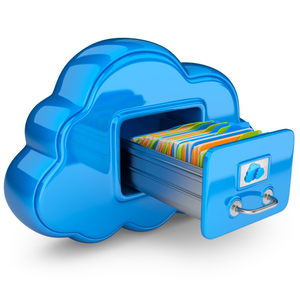Cloud computing is a common term often heard in the IT industry. But, what exactly is cloud computing? Many are unaware and possess insufficient knowledge of what cloud computing is. Cloud computing is simply a type of computing that relies on sharing computing resources rather than having local servers or personal devices to handle applications.
 The word ‘cloud’ is also used as a metaphor for the word ‘internet’. It is therefore understood as the internet based computing where a number of services like servers, storage, applications are delivered to organization’s computers and devices through the Internet. Referring to the cloud itself, it is considered that computing power such as data, storage, software access, applications and others are accumulated in an imaginary bubble known as cloud. Thus, it was named cloud as the cloud symbol was used to represent internet in many diagrams in the history and present.
The word ‘cloud’ is also used as a metaphor for the word ‘internet’. It is therefore understood as the internet based computing where a number of services like servers, storage, applications are delivered to organization’s computers and devices through the Internet. Referring to the cloud itself, it is considered that computing power such as data, storage, software access, applications and others are accumulated in an imaginary bubble known as cloud. Thus, it was named cloud as the cloud symbol was used to represent internet in many diagrams in the history and present.
Understanding cloud computing is very simple; it is the delivery of computing services over the Internet. With this service, individuals and businesses are allowed to use software and hardware that are managed by third parties at remote locations. Some good examples of cloud services are social networking sites, webmail, and online business applications.
But, why is moving to the cloud today’s business demand and priority?
Benefits you could acquire by adapting cloud.
- Flexibility-A cloud-based service can promptly meet the demand of the business as it can hold the vast capacity of the service’s remote servers. The ability to quickly meet business demands is the main reason why you should move to cloud computing.
- Disaster Recovery and Security –Companies relying on cloud services are no longer in need of complex disaster recovery plans as the cloud computing providers take care of most issues. Aberdeen Group survey found that businesses that use cloud were able to resolve issues in an average of 2.1 hours which is nearly four times faster than businesses that do not use cloud based service. Also, the data is secured in the cloud no matter what happens to the physical machine.
- Automatic software updates–Cloud computing suppliers are reliable as they perform server maintenance themselves which includes security updates. As a result, customers’ time and resources for other tasks saved.
- Work from anywhere –Employees can work from anywhere as long as they are connected to the internet. This flexibility can positively affect workers’ work-life balance and productivity.
- Document Control –The workers of the company that does not depend on cloud for service should have to send files back and forth over email, meaning only one person can work on a file at a time. However, this can be managed by cloud computing as it keeps all the files in one central location, and everyone works off of with one central copy. Also, they can chat with each other for making changes together which could eventually make stronger collaboration and thus, increase efficiency of an organization.

[blockquote align=”left”]There are more benefits that can be gained from cloud. To know its use better, try using cloud for your day to day operation; you will feel thedifference yourself. So, aren’t you now ready to move a virtual world – the cloud?
If you still have questions or would like to find out more about how the cloud can benefit you or your business then please get in touch by dialing 020 8293 0100 or email us at info@wavehill.co.uk
[/blockquote]


